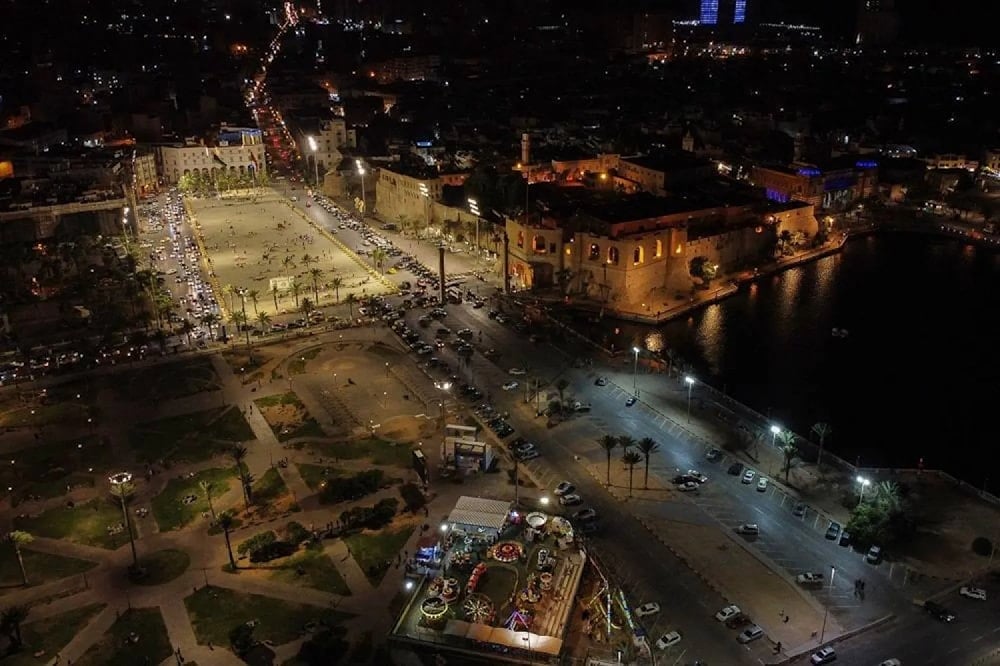Trump plans to send migrants to Libya on a military flight
The Trump administration is preparing to deport migrants to Libya via military aircraft, raising alarm over human rights and legal violations.
-

An aerial view shows cars driving past Martyrs' Square in Tripoli on September 2, 2023. (AFP)
The Trump administration is preparing to deport a group of migrants to Libya aboard a US military aircraft, a move that marks a dangerous escalation in its global deportation strategy and has drawn condemnation from legal experts and human rights groups.
According to US officials cited by Reuters, the flight could depart as early as Wednesday. The nationalities of the deportees remain undisclosed, while the operation is being closely held within federal agencies and may still be delayed by legal, diplomatic, or logistical challenges.
While Libya is currently considered an unstable country, the State Department explicitly warns against travel to the North African nation due to “crime, terrorism, unexploded land mines, civil unrest, kidnapping, and armed conflict.” Nonetheless, the Trump administration is pushing forward with deportation plans, part of its broader effort to deter undocumented migration by signaling that deportees can and will be sent to dangerous countries.
The United States has formal relations only with the UN-recognized government in Tripoli. However, eastern Libya is controlled by Khalifa Haftar, a Trump-era ally. His son, Saddam Haftar, was in Washington last week and met with several administration officials, signaling potential backchannel engagement between the two sides.
Human rights groups condemn use of Libya as a destination
It is worth noting that Amnesty International has described the facilities as “a hellscape,” citing widespread torture, sexual abuse, forced labor, and in some cases, slavery. The Global Detention Project and Human Rights Watch have also documented systemic mistreatment, particularly of sub-Saharan African migrants, many of whom are intercepted by Libyan coast guards and dumped into prisons with no judicial oversight.
In its most recent annual report, the State Department itself reported that migrants, including children, are denied access to courts and held in “harsh and life-threatening” conditions.
“I have been in those migrant prisons and it’s no place for migrants,” said Frederic Wehrey, a senior fellow at the Carnegie Endowment for International Peace. “It’s just a horrific place to dump any vulnerable person.”
Instability in Libya deepened last February when the country's Cabinet Affairs Minister, Adel Juma, was wounded in an assassination attempt in Tripoli. According to a statement from the Tripoli-based Government of National Unity (GNU).
Deportations expand under Trump’s wartime authority
This latest operation follows a string of controversial Trump-era deportations using military logistics. Earlier this year, the administration deported a group of Venezuelans to El Salvador, where they were incarcerated in a maximum-security prison.
Trump and his aides labeled the deportees as violent gang members and used a rarely invoked wartime statute to authorize their removal, an action now being challenged in court.
In a separate case, the Defense Department transported four Venezuelan migrants from Guantánamo Bay, Cuba, to El Salvador without Department of Homeland Security (DHS) officials on board, according to court records. DHS later stated it had not directed the flight, raising further questions about interagency coordination and legal oversight.
Global reach: Panama, Costa Rica, and now Libya
Alongside the Libya operation, the Trump administration has expanded its deportation footprint globally. Earlier this year, hundreds of migrants from the Eastern Hemisphere, including Iranians and Chinese nationals, were deported to Panama and Costa Rica. Some were detained in isolated hotels or jungle camps with minimal notice or due process. In one case, a lawsuit argued that the sudden transfer and detention of children in Costa Rica posed a risk of “irreparable harm.”
Conversely, earlier this year, more than 600 Nigerien nationals were forcibly deported from Libya in one of the largest known expulsions from the country. At the time, critics accused EU nations, particularly Italy, of outsourcing migration control to North African countries like Libya and Tunisia.
Pentagon’s growing role in deportation logistics
The use of US military planes for migrant deportations, once rare, is now central to the administration’s logistics. The Department of Defense has been involved in deportation flights to countries including India, Ecuador, and Guatemala, often without DHS personnel on board, raising alarm among legal experts.
The potential Libya flight is the clearest example yet of how far the administration is willing to go to carry out removals, even if it means sending vulnerable individuals into war zones.
Neither the White House, State Department, nor the Pentagon responded to requests for comment. However, human rights organizations are already preparing to challenge the Libya flight in court if it proceeds.
As legal battles unfold and diplomatic tensions rise, the Trump administration appears committed to expanding its deportation network, even into countries with active armed conflict and well-documented human rights abuses.

 5 Min Read
5 Min Read








